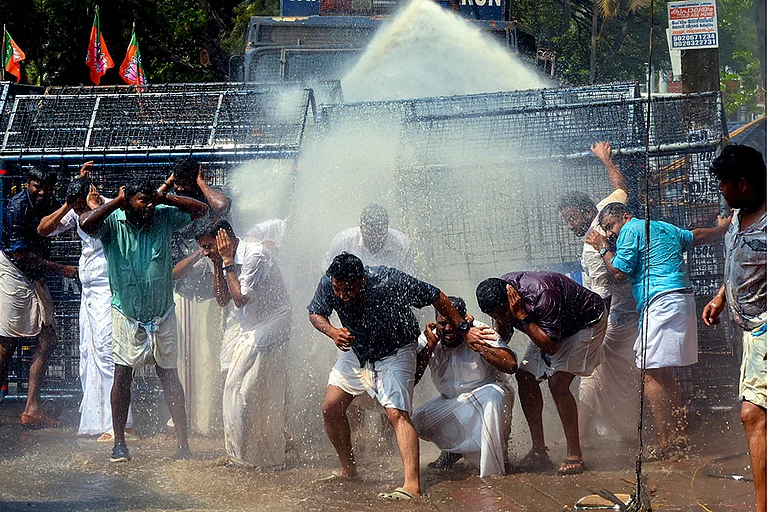Haryana’s ruling party, the BJP received a severe shock on June 4 when it lost 5 out of the State’s 10 Lok Sabha seats to the Congress, which was back in fighting form after over a decade. Now, the BJP is facing the Haryana assembly elections announced today by the Election Commission on the backfoot.
In the previous elections itself, no party had a majority in the 90-member Haryana assembly. The BJP with its 40 MLAs had formed the government by tying up with Dushyant Chautala's Jannayak Janta Party. The JJP, which split from Devi Lal-founded INLD in 2018, won 10 seats in 2019. This helped the party play kingmaker, and the BJP gave Dushyant Chautala the Deputy CM post in return for support.
The alliance, however, dissolved ahead of the Lok Sabha Election in 2024. Dushyant Chautala, who contested the elections independently after the split, told Outlook that the bone of contention with the BJP was the party's refusal to concede what he said was a rightful share of the JJP in the seat-sharing formula.
In Haryana, Jats form a crucial 27% of the vote. However, the relationship between Jats and the BJP has soured after skirmishes over quota demands, the protests against farm laws, and allegations levelled against a prominent BJP leader, Brij Bhushan Sharan Singh.
As a counter to the Jat vote, the BJP is focusing on consolidating the OBC vote. This could become a decisive factor in the upcoming Haryana Assembly elections as OBCs form 30% of the Haryana vote. The BJP had tried OBC consolidation even before the Lok Sabha elections when it made Nayab Singh Saini the Chief Minister. However, the move floundered.
While the Congress is a strong contender this time around, the internal conflicts in the party could play spoilsport. Rohtak MP Deepender Hooda and Sirsa MP Kumari Selja are both considered strong contestants for the CM's position. It will also be very interesting to see the extent to which Jayant Chautala and his JJP can make an impact in the election, given a seemingly weak BJP and a strengthening Congress in Haryana.
Another key issue that will be highlighted this time is in the agriculture sector. Many farmers are still protesting at the Shambhu border, and a good chunk of them hail from Haryana. Apart from their demand of getting minimum support price for crops as per the Swaminathan Committee report, there is also resentment among Haryana farmers because of the government is purchasing crops through online portals
Over 37 lakh hectares of land — approximately 84 per cent of the total land — is under cultivation in Haryana, mostly with wheat, gram, sugar cane, and oil seed. The Union government has created portals like eRAKAM in the last few years with which farmers can sell their crops online. However, the farmers allege that there is limited time given to sell a crop and it is very difficult to get the crop packed and registered on the portal. Though the government has talked about logistical support for the farmers, the farmers say they have, so far, been denied that.
A new issue that has sprung up, especially after the Paris 2024 Olympics, concerns sports budget allocations under the Khelo India Scheme. Rohtak-based wrestling coach Shambhu Singh claims that the central government allocated only Rs 66 crore to Haryana for its sports budget, though 24 competitors from Haryana participated in the Olympics. In contrast, the government allocated Rs 426 crore for sports in Gujarat, though the Gujarat government sent only 2 competitors to the Olympics; and Uttar Pradesh, which sent 6 competitors, received Rs 438 crore. Shambhu argues that despite Haryana's strong performance in sports, the central government is taking Haryana for granted by allocating insufficient funds.



























